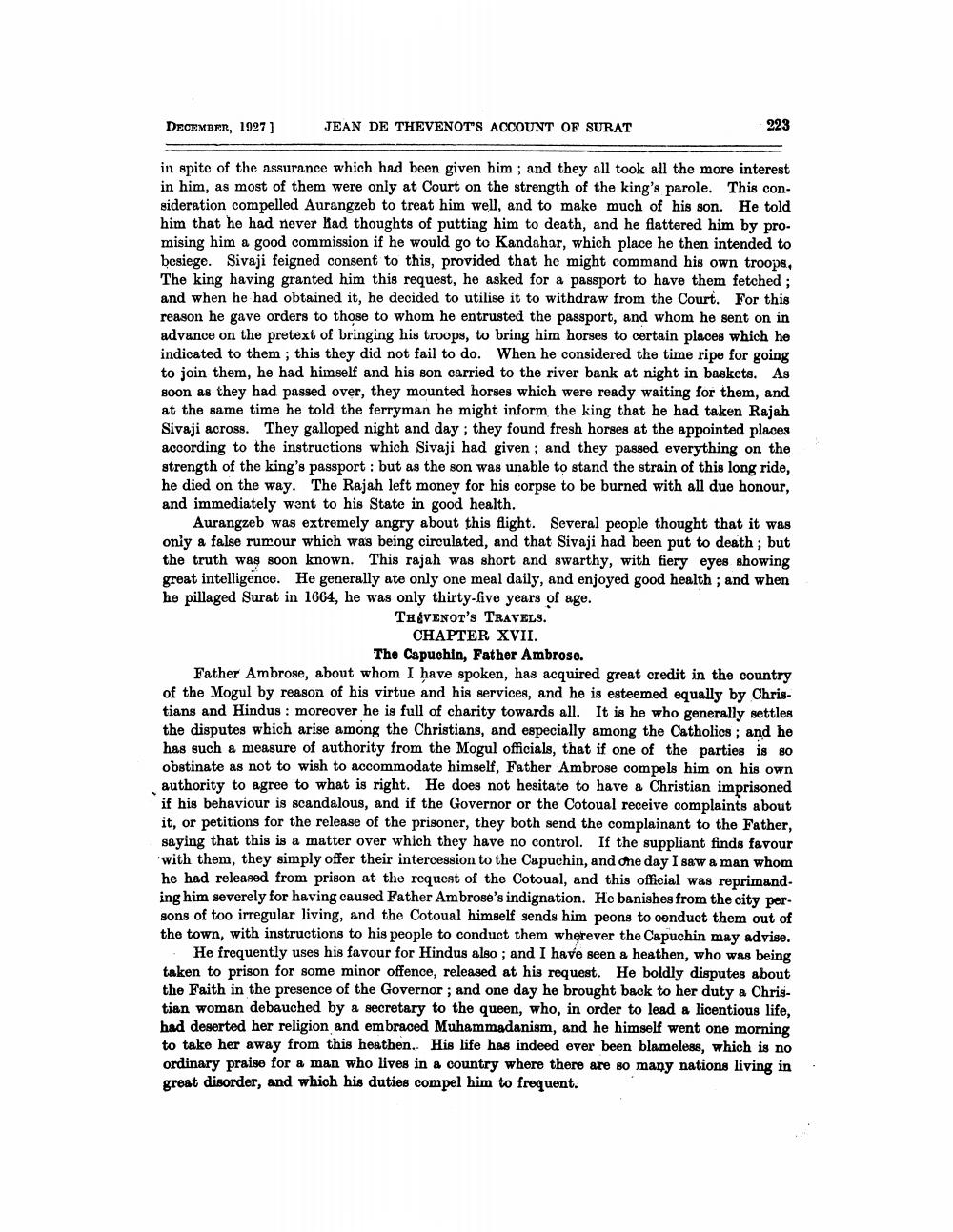________________
DECEMDER, 1927]
JEAN DE THEVENOTS ACCOUNT OF SURAT
223
in spite of the assurance which had been given him; and they all took all the more interest in him, as most of them were only at Court on the strength of the king's parole. This consideration compelled Aurangzeb to treat him well, and to make much of his son. He told him that he had never had thoughts of putting him to death, and he flattered him by promising him a good commission if he would go to Kandahar, which place he then intended to besiege. Sivaji feigned consent to this, provided that he might command his own troops, The king having granted him this request, he asked for a passport to have them fetched; and when he had obtained it, he decided to utilise it to withdraw from the Court. For this reason he gave orders to those to whom he entrusted the passport, and whom he sent on in advance on the pretext of bringing his troops, to bring him horses to certain places which he indicated to them; this they did not fail to do. When he considered the time ripe for going to join them, he had himself and his son carried to the river bank at night in baskets. As soon as they had passed over, they mounted horses which were ready waiting for them, and at the same time he told the ferryman he might inform the king that he had taken Rajah Sivaji across. They galloped night and day; they found fresh horses at the appointed places according to the instructions which Sivaji had given ; and they passed everything on the strength of the king's passport : but as the son was unable to stand the strain of this long ride, he died on the way. The Rajah left money for his corpse to be burned with all due honour, and immediately went to his State in good health.
Aurangzeb was extremely angry about this flight. Several people thought that it was only a false rumour which was being circulated, and that Sivaji had been put to death; but the truth was soon known. This rajah was short and swarthy, with fiery eyes showing great intelligence. He generally ate only one meal daily, and enjoyed good health ; and when he pillaged Surat in 1664, he was only thirty-five years of age.
THGVENOT'S TRAVELS.
CHAPTER XVII.
The Capuchin, Father Ambrose. Father Ambrose, about whom I have spoken, has acquired great credit in the country of the Mogul by reason of his virtue and his services, and he is esteemed equally by Christians and Hindus : moreover he is full of charity towards all. It is he who generally settles the disputes which arise among the Christians, and especially among the Catholics; and he has such a measure of authority from the Mogul officials, that if one of the parties is so obstinate as not to wish to accommodate himself, Father Ambrose com pels him on his own authority to agree to what is right. He does not hesitate to have a Christian imprisoned if his behaviour is scandalous, and if the Governor or the Cotoual receive complaints about it, or petitions for the release of the prisoner, they both send the complainant to the Father, saying that this is a matter over which they have no control. If the suppliant finds favour with them, they simply offer their intercession to the Capuchin, and the day I saw a man whom he had released from prison at the request of the Cotoual, and this official was reprimand. ing him severely for having caused Father Ambrose's indignation. He banishes from the city persons of too irregular living, and the Cotoual himself sends him peons to conduct them out of the town, with instructions to his people to conduct them wherever the Capuchin may advise.
He frequently uses his favour for Hindus also ; and I have seen a heathen, who was being taken to prison for some minor offence, released at his request. He boldly disputes about the Faith in the presence of the Governor; and one day he brought back to her duty a Christian woman debauched by a secretary to the queen, who, in order to lead a licentious life, had deserted her religion and embraced Muhammadanigm, and he himself went one morning to take her away from this heathen. His life has indeed ever been blameless, which is no ordinary praise for a man who lives in a country where there are so many nations living in great disorder, and which his duties compel him to frequent.
.




